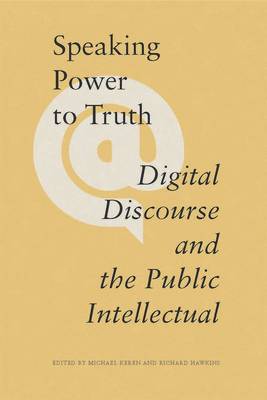
- Afhalen na 1 uur in een winkel met voorraad
- Gratis thuislevering in België vanaf € 30
- Ruim aanbod met 7 miljoen producten
- Afhalen na 1 uur in een winkel met voorraad
- Gratis thuislevering in België vanaf € 30
- Ruim aanbod met 7 miljoen producten
Speaking Power to Truth
Digital Discourse and the Public Intellectual
Omschrijving
Online discourse has created a new media environment for contributions to public life, one that challenges the social significance of the role of public intellectuals--intellectuals who, whether by choice or by circumstance, offer commentary on issues of the day. The value of such commentary is rooted in the assumption that, by virtue of their training and experience, intellectuals possess knowledge--that they understand what constitutes knowledge with respect to a particular topic, are able to distinguish it from mere opinion, and are in a position to define its relevance in different contexts. When intellectuals comment on matters of public concern, they are accordingly presumed to speak truth, whether they are writing books or op-ed columns or appearing as guests on radio and television news programs. At the same time, with increasing frequency, discourse on public life is taking place online--l an environment that is characterized by an abundance of speakers, discussion, and access. But has this democratization of knowledge, as some describe it brought with it a corresponding increase in truth?
Casting doubt on the assertion that online discourse, with its proliferation of voices, will somehow yield collective wisdom, Speaking Power to Truth raises concerns that this wealth of digitally enabled commentary is, in fact, too often bereft of the hallmarks of intellectual discourse: an epistemological framework and the provision of evidence to substantiate claims. Instead, the pursuit of truth finds itself in competition with the quest for public reputation, access to influence, and enhanced visibility. In exploring the implications of the digital transition, the contributors to Speaking Power to Truth provide both empirical evidence of, and philosophical
Specificaties
Betrokkenen
- Uitgeverij:
Inhoud
- Aantal bladzijden:
- 216
- Taal:
- Engels
- Reeks:
Eigenschappen
- Productcode (EAN):
- 9781771990332
- Verschijningsdatum:
- 1/02/2016
- Uitvoering:
- Paperback
- Formaat:
- Trade paperback (VS)
- Afmetingen:
- 150 mm x 226 mm
- Gewicht:
- 340 g

Alleen bij Standaard Boekhandel
Beoordelingen
We publiceren alleen reviews die voldoen aan de voorwaarden voor reviews. Bekijk onze voorwaarden voor reviews.










